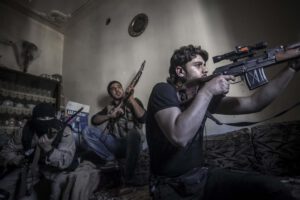 Missiles struck the town of Atmeh, just a couple of miles from the border, where a makeshift refugee camp in the surrounding hills harbors thousands of Syrians who fled their homes amid the grinding 20-month-old conflict.
Missiles struck the town of Atmeh, just a couple of miles from the border, where a makeshift refugee camp in the surrounding hills harbors thousands of Syrians who fled their homes amid the grinding 20-month-old conflict.
The strikes were some of the closest to the northern border so far. They came as Turkey prepared to bring NATO officials to the area Tuesday to inspect possible locations for Patriot air-defense missile batteries. Members of the alliance agreed last week to consider Turkey’s requests to help secure the 560-mile border, and NATO is expected to announce a formal decision on whether it will provide Patriot missiles to Turkey after surveying potential sites.
Mustafa Sheikh, the leader of the rebels’ main military council, whose headquarters is in Atmeh, said by telephone that the Syrian strikes Monday were intended to “terrify refugees and local people.”
However, other activists said the strikes were apparently aimed at a military target.
Both Turkey and NATO have made clear that the Patriot missile system would be purely defensive and would not be used to enforce a no-fly zone within Syria’s borders. But Damascus has described the move as “provocative.”
In the meantime, it is ordinary Syrians who continue to bear the brunt of the conflict.
“People are terrified, and many refugees are leaving the Atmeh area, but we doubt that Turkey will let many of them cross the border,” said Mulham al-Jundi, a member of the opposition Syrian National Council based in the Turkish border town of Reyhanli.
There are an estimated 2.5 million internally displaced refugees in Syria; they often live in squalid conditions, and human rights groups have urged Turkey to fully open its borders to those fleeing.
A camp organizer at Atmeh said plans are being considered to split the refugees into several smaller border encampments, to enhance their safety.
One local activist who spoke on the condition of anonymity said Monday’s raid missed the main rebel base but damaged a supply depot. Another said three rockets hit farmland and two others hit buildings near the base.
The Associated Press said several people were killed and wounded in the airstrikes. No details about the casualties were immediately available.
At Bab al-Hawa, fighters milled about alongside refugees after the bombing, loading vehicles with food, bedding and other supplies. Turkish officials and soldiers, who refused to be photographed, worked alongside them. Bab al-Hawa is in an area that was essentially a no man’s land before the Syrian rebellion began last year, but is now rebel-held territory.
Syria’s rebels have been gaining momentum with a series of significant strategic wins in recent days. After several days of fighting, they seized control Monday of the hydroelectric Tishrin Dam on the Euphrates River in the northern part of the country.
Rami Abdulrahman, a pseudonym for the director of the Britain-based Syrian Observatory for Human Rights, described the capture of the dam, which supplies several areas of the country with electricity, as a “major blow” to the government.
The rebel Free Syrian Army said it also has taken control of the Marj al-Sultan air base, just outside Damascus.
Activists said that at least eight children were killed when cluster bombs hit a school in the nearby village of Deir al-Asafir as the Syrian military tried to regain its grip on the area. Those reports could not be independently confirmed.
(The Washington Post)
















 Afrikaans
Afrikaans Shqip
Shqip አማርኛ
አማርኛ العربية
العربية Հայերեն
Հայերեն Azərbaycan dili
Azərbaycan dili Euskara
Euskara Беларуская мова
Беларуская мова বাংলা
বাংলা Bosanski
Bosanski Български
Български Català
Català Cebuano
Cebuano Chichewa
Chichewa 简体中文
简体中文 繁體中文
繁體中文 Corsu
Corsu Hrvatski
Hrvatski Čeština
Čeština Dansk
Dansk Nederlands
Nederlands English
English Esperanto
Esperanto Eesti
Eesti Filipino
Filipino Suomi
Suomi Français
Français Frysk
Frysk Galego
Galego ქართული
ქართული Deutsch
Deutsch Ελληνικά
Ελληνικά ગુજરાતી
ગુજરાતી Kreyol ayisyen
Kreyol ayisyen Harshen Hausa
Harshen Hausa Ōlelo Hawaiʻi
Ōlelo Hawaiʻi עִבְרִית
עִבְרִית हिन्दी
हिन्दी Hmong
Hmong Magyar
Magyar Íslenska
Íslenska Igbo
Igbo Bahasa Indonesia
Bahasa Indonesia Gaeilge
Gaeilge Italiano
Italiano 日本語
日本語 Basa Jawa
Basa Jawa ಕನ್ನಡ
ಕನ್ನಡ Қазақ тілі
Қазақ тілі ភាសាខ្មែរ
ភាសាខ្មែរ 한국어
한국어 كوردی
كوردی Кыргызча
Кыргызча ພາສາລາວ
ພາສາລາວ Latin
Latin Latviešu valoda
Latviešu valoda Lietuvių kalba
Lietuvių kalba Lëtzebuergesch
Lëtzebuergesch Македонски јазик
Македонски јазик Malagasy
Malagasy Bahasa Melayu
Bahasa Melayu മലയാളം
മലയാളം Maltese
Maltese Te Reo Māori
Te Reo Māori मराठी
मराठी Монгол
Монгол ဗမာစာ
ဗမာစာ नेपाली
नेपाली Norsk bokmål
Norsk bokmål پښتو
پښتو فارسی
فارسی Polski
Polski Português
Português ਪੰਜਾਬੀ
ਪੰਜਾਬੀ Română
Română Русский
Русский Samoan
Samoan Gàidhlig
Gàidhlig Српски језик
Српски језик Sesotho
Sesotho Shona
Shona سنڌي
سنڌي සිංහල
සිංහල Slovenčina
Slovenčina Slovenščina
Slovenščina Afsoomaali
Afsoomaali Español
Español Basa Sunda
Basa Sunda Kiswahili
Kiswahili Svenska
Svenska Тоҷикӣ
Тоҷикӣ தமிழ்
தமிழ் తెలుగు
తెలుగు ไทย
ไทย Українська
Українська اردو
اردو O‘zbekcha
O‘zbekcha Tiếng Việt
Tiếng Việt Cymraeg
Cymraeg isiXhosa
isiXhosa יידיש
יידיש Yorùbá
Yorùbá Zulu
Zulu